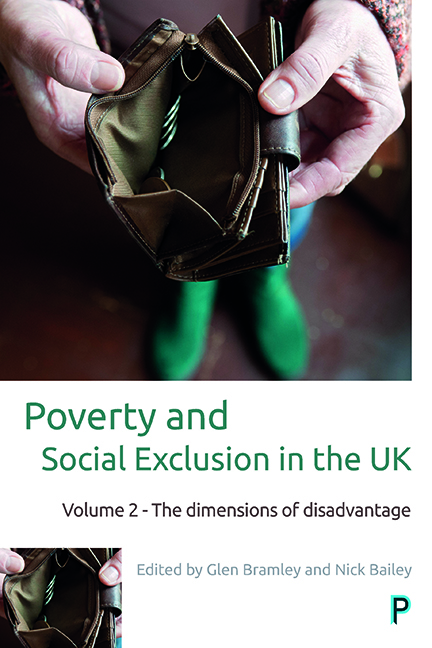twelve - The poverty of well-being
Published online by Cambridge University Press: 12 April 2022
Summary
Introduction
The main aim of this chapter is to explore the material basis of well-being using data from the Poverty and Social Exclusion UK (PSE-UK) 2012 survey. The chapter begins by reviewing contemporary discussions of well-being and the ubiquitous presence of the concept in public and private sector discourses. It explores the ideas behind the rise of the ‘happiness industry’ and shows how the measurement of well-being has been at the forefront of some recent developments in official statistics, principally through survey questions on life satisfaction, happiness and anxiety.
Using the PSE-UK data, we analyse the relationship between poverty and satisfaction/dissatisfaction with various circumstances such as employment, accommodation and neighbourhood, as well as between poverty and overall satisfaction with life and feeling part of the community. Several measures of income poverty and deprivation are used to explore the consistency of relationship between very low levels of satisfaction with life and poverty. We also use regression analysis to distinguish the impact on overall well-being of factors such as material deprivation, long-term illness, age and employment status.
The chapter concludes with a discussion of well-being and social policy. One of the consequences of the mainstreaming of well-being is that subjective happiness scores are now receiving much more attention than traditional measures of social justice (such as unemployment, poverty and mortality rates). The explicit assumption is that how people feel is more important to both the outcomes of policies and to the way governments seek to achieve social policy goals in the era of austerity – by ‘nudging’, and in many cases compelling, individuals towards healthier and more enriching behaviours. On the basis of the PSE-UK evidence, we argue that substantial gains in well-being are most likely to be achieved by reducing poverty and providing more support to those with long-term illnesses and disabilities.
The ubiquity of well-being
The promotion of well-being has lately become all things to all people. ‘Well-being’ and the associated concepts of ‘happiness’ and ‘quality of life’ are liberally used in public and private sector discourses as if there is now universal agreement on the common purpose of corporate effort and activity (Scott, 2012).
- Type
- Chapter
- Information
- Poverty and Social Exclusion in the UK Vol 2The dimensions of disadvantage, pp. 289 - 308Publisher: Bristol University PressPrint publication year: 2017



